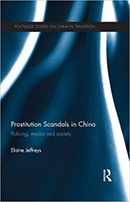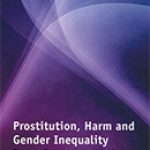Prostitution Scandals in China: Policing, Media and Society
 Author: Elaine Jeffreys
Author: Elaine Jeffreys
Publisher: London; New York: Routledge, 2012. 196 p.
Reviewer: Tiantian Zheng │ January 2013
Based on a review of media coverage of prostitution-related scandals in China from the late 1990s to the present day, this book argues that prostitution is a topic of debate that sparks discussions about issues such as law, rights, and corruption. While the Chinese government continues police raids of the sex industry, the harsh measures are at odds with public health interventions that provide training and employment options for young women who sell sex. Legalization and decriminalization of prostitution are also proposed to prevent HIV/AIDS transmission, minimize corruption, and offer protection to sex sellers.
The author, Elaine Jeffreys, provides the necessary background information in the introduction for the main body of the book. Jeffreys discusses the reasons for the resurgence of prostitution in reform-era China, and explores the evolution of laws and regulations concerning prostitution control. In addition, she discusses the development of mass media in China.
The main body of the book is devoted to an examination of the prostitution-related scandals highlighted by the mass media since the 1990s. Jeffreys defines “scandals” as “shocking” stories narrated in the media that have fueled subsequent public discussions. She records seven scandals of forced prostitution, youth prostitution, male-male prostitution, penalizing male buyers of sex, police corruption, policing excesses, and public health interventions. Discussion of each scandal constitutes an individual chapter in the main body of the book.
The first is related to a story of a young migrant woman who threw herself from a building to escape forced prostitution; an action that resulted in first-degree spinal damage. Through a comparison of this story with more recent cases, Jeffreys argues that such reportage not only has a positive impact in galvanizing social support for the vulnerable victims of sexual exploitation, but also has a negative impact in reenacting the social ideal of women’s chastity and chasteness.
The second scandal involves voluntary and forced prostitution of children and young adults. Jeffreys compares a case of high-school girl prostitution with other cases such as university student prostitution. Through a discussion of the media debate surrounding these cases, she argues that youth prostitution is a widely-accepted social problem in China, and that legal reforms are likely to follow to protect children.
The third scandal concerns male-male prostitution, which has spawned media debate about a new stipulation in the rule of law in China on same-sex prostitution. The author details these debates and argues that HIV/AIDS prevention has unleashed public discussions of the need for acceptance of same-sex behaviors.
The fourth scandal revolves around the penal punishment of a professor who bought sex. Here Jeffreys outlines the debate about this incident, and criticizes the widespread view that the Chinese Communist Party takes a repressive stance toward the mass media. She debunks this view and argues that the CCP offers and promotes media freedom, which allows the media to freely publicize information without state control. This argument warrants further empirical evidence to sustain its validity. More specifically, since the only data this book relies on is media representations, the argument derived from such data calls for corroborated evidence from what really happens on the ground, which is real people’s lived experiences. While a scrutiny of that reality reveals an overwhelming number of surveilled, arrested, persecuted, and jailed rights-activists who speak their minds freely (such as artist Ai Weiwei, writer Liu Xiaobo, attorney Chen Guangcheng, and movie producers such as Cui Zi’en), a critical reader would not be convinced until the author tackles the gap between the argument and the reality that contradicts the argument – a gap evidenced by people’s loss of freedom as a result of speaking out.
In the discussions of the remaining three scandals on police corruption, policing excesses, and public health interventions, the author argues that the Chinese government introduces new, stricter laws to control police corruption and better protect citizens’ human rights.
In the conclusion, Jeffreys contends that public debates about prostitution impact public policy and enhance the accountability of officials and institutions. Elaine Jeffreys predicts that new laws on prostitution are in store in China.
Tiantian Zheng, Ph.D., Professor, Anthropology, State University of New York, Cortland


